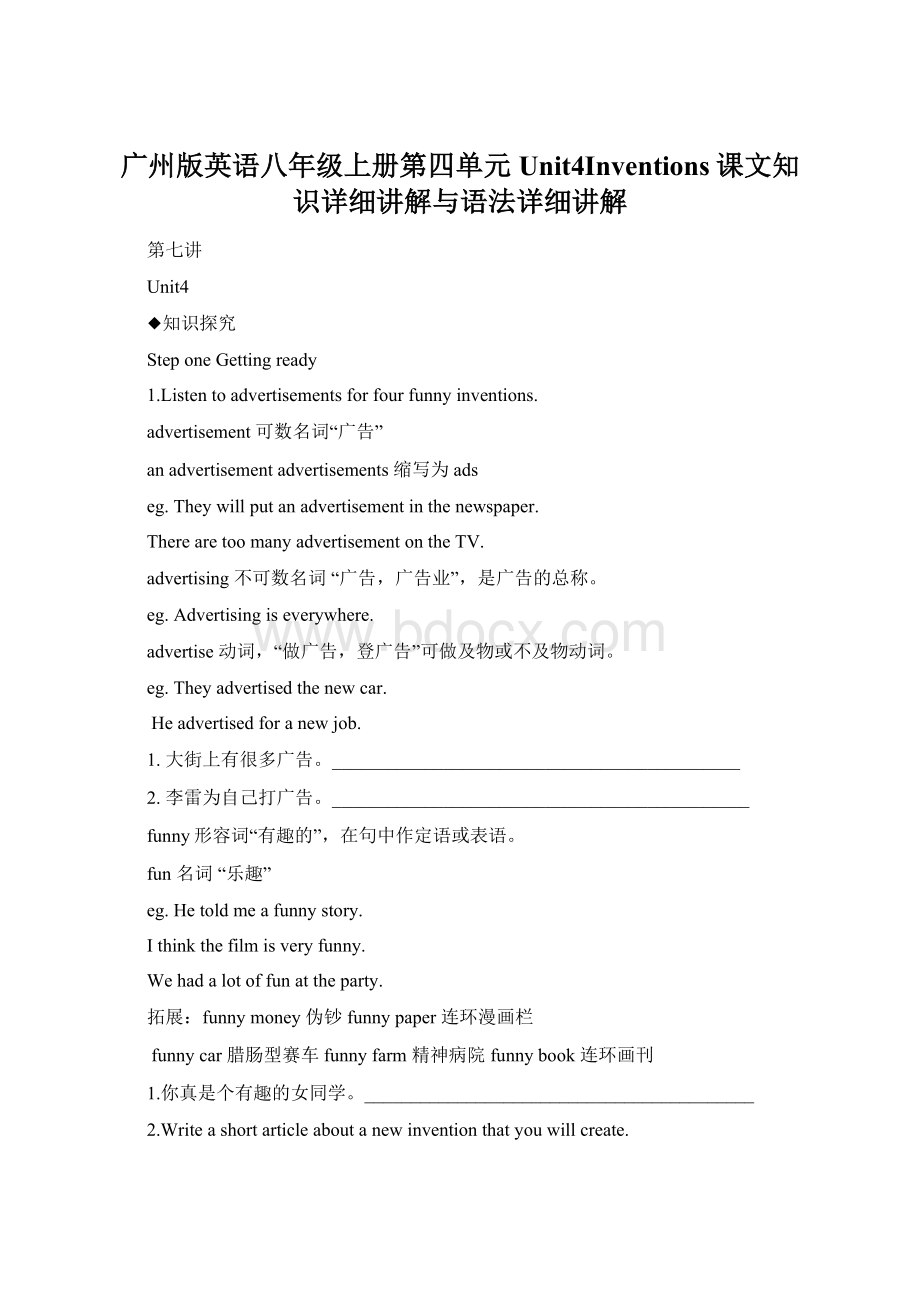广州版英语八年级上册第四单元Unit4Inventions课文知识详细讲解与语法详细讲解.docx
《广州版英语八年级上册第四单元Unit4Inventions课文知识详细讲解与语法详细讲解.docx》由会员分享,可在线阅读,更多相关《广州版英语八年级上册第四单元Unit4Inventions课文知识详细讲解与语法详细讲解.docx(18页珍藏版)》请在冰豆网上搜索。

广州版英语八年级上册第四单元Unit4Inventions课文知识详细讲解与语法详细讲解
第七讲
Unit4
◆知识探究
SteponeGettingready
1.Listentoadvertisementsforfourfunnyinventions.
advertisement可数名词“广告”
anadvertisementadvertisements缩写为ads
eg.Theywillputanadvertisementinthenewspaper.
TherearetoomanyadvertisementontheTV.
advertising不可数名词“广告,广告业”,是广告的总称。
eg.Advertisingiseverywhere.
advertise动词,“做广告,登广告”可做及物或不及物动词。
eg.Theyadvertisedthenewcar.
Headvertisedforanewjob.
1.大街上有很多广告。
____________________________________________
2.李雷为自己打广告。
_____________________________________________
funny形容词“有趣的”,在句中作定语或表语。
fun名词“乐趣”
eg.Hetoldmeafunnystory.
Ithinkthefilmisveryfunny.
Wehadalotoffunattheparty.
拓展:
funnymoney伪钞funnypaper连环漫画栏
funnycar腊肠型赛车funnyfarm精神病院funnybook连环画刊
1.你真是个有趣的女同学。
__________________________________________
2.Writeashortarticleaboutanewinventionthatyouwillcreate.
create及物动词“创造,创作”指经过努力让事物从无到有或从粗糙到完美,对象可以是具体的或者抽象的。
eg.Hecreatedmanyfamousplays.
Hecreatedthewonder.
拓展:
create作可数名词“创造物,作品”
作不可数名词“创造,创建”
creator可数名词“创作者”
creative形容词“有创造力的”
eg.Thecreatorcreatedthecreation.Heiscreative.
辨析:
create与make
create创造出原来不存在的东西make通过工作制造出某种东西
eg.Whocreatedtheworld.
Hemadethewatch.
1.达芬奇是一个创作家,他创造了许多名画。
__________________________________________________________.
【随堂练】:
一、用所给词的适当形式填空。
He is an (invent),he (invent)lots of (invent).
2. She_____ (born) in China.
3. She (realize) she was wrong yesterday.
4. The p is so high,it is so e .
5. Surfing the internet is p among teenage.
6. The idea is p ,we will take thisidea.
7. This toy is s ,and I have never seen it before.
8. She created many famous works,and she was .(create)
二、完成句子
1.自那以后,我就已经学会照顾自己.
Ihavelearnedtotakecareofmyself.
2.我们已经三年没有联系了.
Weeachotherforthreeyears.
3.请远离毒品,学会保护自己.
Pleasedrugs,andlearntoprotectyourself.
4.我们很相爱,同时,我们互相照顾对方.
Weloveeachother,wetakegoodcareofeachother.
5.勤劳在白天,作息在晚上.
Work,andrestatnight.
SteptwoReading&listening
3telephone
可数名词“电话,电话机”缩写形式phone
eg.Idon’thaveatelephone.
Tonyoftentalkswithmeonthetelephone.
动词“打电话”
eg.Itelephonemygrandmaeveryweek.
拓展:
“给某人打电话”表达
telephone/phonesb
callsb(up)
givesbacall
makeatelephonecalltosb
eg.Ioftentelephone/phonemyparentsonweekends.
Pleasecallme(up)thisevening.
Pleasegivemeacallwhenyougethome.
Mybestfriendoftenmakesatelephonecalltome.
1.到家了就给我打电话。
_________________________________
4.Theyhelppeopleliveabetterlife.
live及物动词“过…的生活”livea…life
eg.liveagood/rich/poorlife.
1.我们过去过着贫穷的生活。
___________________________________
5.Afteritsinvention,travelingbecamefasterandmorecomfortable.
comfortable形容词“舒适的,舒服的”反义词uncomfortable
comfort名词和动词“舒适,安慰”
comfortably副词
eg.Ilikecomfortablelife.
Ifeeluncomfortablenow.Iwanttogohome.
Thenewcarbecomesmorecomfortable.
中考链接:
Whathesaidmadeeveryonefeel.
A.comfortB.comfortableC.comfortingD.comfortably
6.Intheearly19thcentury…
century可数名词“世纪,百年”一世纪指一百年,不指具体时间,只指时间段
eg.Hewasborninthe20thcentury.
Twocenturieslater,peoplestillrememberhim.
拓展:
twentieth-century“20世纪的”是一个序数词+名词构成的形容词,作定语。
“在第几世纪”必须用序数词,而且应在序数词前加定冠词the
eg.Itwasatwentieth-centuryinvention.
inthe21stcentury
inthemid-19thcentury/inthemiddleofthe19thcentury
7.AlexanderGrahamBellinventedoneofthefirstpracticaltelephonesin1876.
invent及物动词“发明”
eg.Doyouknowwhoinventedcomputer?
Heinventedagreencar.
辨析invent与discover
invent“发明”指客观上没有,发明以前未曾有过的东西,如新工具,新方法
discover“发现”指发现客观上已经存在,但不为人知的事物
eg.Gilbertdiscoveredelectricity,butEdisoninventedtheelectriclightbulb.
8.Sincethen,peoplehavebeenabletospeaktoeachotheroverlongdistances.
distance可用作可数名词和不可数名词“距离”
eg.Keepasafedistancebetweencars.
Whatisthedistancefromheretoyourschool?
拓展:
与distance相关的表达
atadistance隔一段距离inthedistance在远处
fromadistance从远处outofdistance(from)离…太远,达不到
9.Theyallowpeopletokeepintouchwitheachotheranytime,anywhere.
allow及物动词,“允许”allowsbtodosth“允许某人做某事”动词不定式作宾语补足语。
eg.Myparentsdon’tallowmetogooutatnight.
DoyouallowustowatchTV?
拓展:
allowdoingsth允许做某事
beallowedtodosth被允许做某事
eg.Hedoesn’tallowsmokinghere.
Passagesarenotallowedtosmoke.
中考链接:
Taketimetorelaxbylisteningtomusic,readingabookorjustspendingsometimealone.Relaxingallowsyoutoyourstudieswithmoreenergy.
A.returnB.toreturnC.returning
keepintouch(withsb)“与…保持联系”=stayintouch(withsb)
eg.Weshouldkeepintouchwitheachother.
We’llalwayskeep/stayintouch.
10.ThomasEdisondevelopedthefirstpracticallightbulbin1879.
develop及物动词“开发,研制”
eg.Weneedtodevelopsolarenergy.
Theyaredevelopinganewcar.
拓展:
develop还可用作不及物动词,“发展”
developed形容词“发达的”developing形容词“发展中的”
development名词“发展,开发”
eg.Everythingdevelops.
TheUSisadevelopedcountry,IndiaandChinaaredevelopingcountries.
中考链接:
It’shelpfultoagoodhabitofreadinginlanguagelearning.
A.takeB.showC.developD.math
11.Withlightbulb,peoplecandoasmanythingsintheeveningsastheycaninthedaytime.
daytime不可数名词,意为“白天,日间”inthedaytime在白天
Tigersandfoxesoftensleepinthedaytime.
Heworksinthedaytimeandhelpsmewithmyhouseworkintheevening.
12.thenewcarsmadeloudnoisesandfrightenedthem.
makenoises“发出噪音,弄出声音”make(a)noise
Don’tmakenoises.Yourfatherissleeping.
辨析noise,voice与sound
noise
噪音,喧闹声
指吵闹、喧哗声,往往是不和谐、不悦耳的声音
voice
噪音
尤指人或动物特有的声音,如说话声、歌声、笑声等
sound
声音
泛指自然界中的一切声音
Healwaysmakesloudnoises.
Sheoftentalksinalowvoice.
Lighttravelsfasterthansound.
中考链接:
Stopmakingsomuch.Thechildrenaresleeping.
A.voiceB.noiseC.sound
13.Isupposethatpeoplecouldonlydriveinthe(4)daytimebecausethosecarsdidn’thavelights.
suppose及物动词“认为,猜想,想象”后接从句作宾语,常和“suppose+sb+(+tobe)+形容词/名词”结构作同义句转换。
suppose,think,believe等后跟宾语从句时,主句的主语是第一人称时,若变为否定句,必须否定前移,即把否定句转移到主句上来。
Doyousuppose…Yes,Isupposeso/No,Isupposenot或No,Idon’tsupposeso.
eg.Idon’tsupposeheisthirty.
-Doyousupposeitisgoingtorain?
-Yes,Isupposeso/No,Isupposenot或No,Idon’tsupposeso.
拓展:
besupposedtodo“被要求做某事,应该做某事,被期望做某事”
相当于shoulddosth
eg.Teachersaresupposedtoknowalot.
中考链接:
YouaretotypequicklywhentalkingtoeachotheronQQsotheotherpersondoesn’tgetbored.
A.suggestedB.supposedC.taughtD.supported
【随堂练】:
一、完成句子
1.她住在乡村,我住在城市.
Shelived,andIlivedincity.
2.我们一起走一下吧.
Let,s.
3.很久以前,这里住着公主和王子.
princessandprincelivedhere.
4.不好意思,我没意识到我错了.
Sorry,IIwaswrong.
5.我已经三年没有跟她联系了.
Ihaven,talreadyher.
二、用good,bad,as...as...填空。
1.Whogota(good)markinPE,MarkorMary?
2.Whogota(bad)markinPE,MarkorMary?
MarkgotabettermarkinPE.
3.Whosehomeis(far)fromschool,Mark,sorMary,s?
4.Whogota(good)markinPEinyourclass?
5.Whogota(bad)markinPE,inyourclass.
6.Whosehomeis(far)fromschool,Mark,s,Lintao,sorMary,s?
7.Hercomputerwasas(good)asmine.
8.Themachinecanproduceas(much)productionashers
9.Thecomputerwas(good)thanthatone.
Stepthree-Listening讲解
1.keepthedustoffyourshoes
keep…off“使…不接近(或不接触,远离)”
eg.Keepitofftheshoes.
Shewearssunglassestokeepthesunoff.
dust不可数名词,“灰尘,尘土”
throwdustinone’seyes
dustbinduststorm
2.canlookbehindandinfrontofyouatthesametime.
atthesametime“同时”其中same为形容词,在使用前一定要加定冠词the。
eg.Theyarrivedatschoolatthesametimeyesterdaymorning.
Youmusthandinyourpapersatthesametime.
【随堂练】:
一、完成句子
1.木马太重了,他们不能随身带走。
Thewoodenhorsewas___________heavy___________them______________________withthem.
1.他终于成功地写完了这本书。
Atlasthe_________________________________thisbook.
2.最后制造皇冠的人被送进监狱。
Intheendthecrown-maker____________________________________________.
3.他自从来到这间学校,认识了许多朋友。
he______________________manyfriendssincehe___________tothisschool.
4.今晚我不去看电影,因为我看过了。
Iwon’tgotothecinema,becauseI______________________it.
5.好久不见,你到哪里去了?
I______________________youforalongtime.Where___________you___________?
Stepfour-Speaking&Writing
1.Wemakeourvoiceriseattheend.
辨析rise与raise
rise
不及物动词
指自然地上升;表示(太阳、价格等)上升、(河水)上涨、起立、起床
raise
及物动词
指人为地增加、上涨、升上去等;表示举手、升国旗、饲养抚育等意思
eg.Themoonabovethemountains.
Beforeyouanswerthequestion,youshouldyourhand.
2.Whatdoyouuseitfor?
辨析whatfor与why
what...for
侧重于问目的,一般不用because回答
——Whatdoyouwantabasketfor?
——Iwanttobuysomeapples.
why
侧重于询问原因,一般要用because回答
——Whywereyoulateforschool?
——BecauseImissedtheearlybus.
3.Whatisspecialaboutit?
special形容词,“特别的,特殊的”
辨析special与specially
special
形容词
表示“特殊的,特别的”反义词是ordinary,强调事物特有的性质或专门的目的、用途
Thereissomethingspecialyoucandointhepark.
specially
副词
表示“特别的,尤其”
Icameherespeciallytoseeyou.
中考链接:
——WhatwasJimwearingintheparty?
——Nothing.Hewasinhisusualshirtandjeans.
A.specialB.simpleC.importantD.interesting
4.Ifyoushout“fly”,thecarwillturnintoaplanein30second.
turninto“变成,成为”
eg.Thesofaturnsintoabed.
Therobotturnsintoahugespidersoon.
拓展:
turnaway把…打发走turnon打开
turnoff关上turnup调大
turndown调小turnover翻身
【随堂练】
一、单项选择
1. We _______ be rude to our parents.
A.ought B.ought to C.ought not D.ought not to
2. I would like ______ an English song for you.
A.sing B.to sing